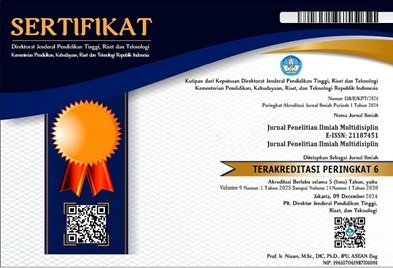PENEGAKAN HUKUM TERHADAP PEMBERANTASAN TINDAK PIDANA TERORISME DI INDONESIA
Kata Kunci:
Terorisme, Undang-undang, HukumAbstrak
Permasalahan terorisme merupakan tantangan serius yang dihadapi oleh banyak negara di dunia saat ini. Aksi-aksi teror telah menyebabkan korban tanpa pandang bulu dan mengancam kedamaian serta keamanan masyarakat secara luas. Untuk menghadapi tantangan ini, negara-negara perlu memiliki konsep hukum pidana yang kuat dalam menanggulangi terorisme. Pembahasan mengenai terorisme memiliki kompleksitas tersendiri karena dipengaruhi oleh berbagai faktor, termasuk motif politis atau ideologis di balik aksi tersebut. Meskipun sebagian besar negara telah mengatur tindak pidana terorisme dalam peraturan hukum pidana nasional mereka, namun karakteristik ketentuan tersebut sering kali berbeda dengan norma-norma hukum untuk kejahatan lainnya. Pencegahan dan pemberantasan terorisme menjadi komitmen bersama masyarakat internasional, tercermin melalui berbagai konvensi internasional. Indonesia, sebagai bagian dari komunitas internasional, juga memiliki kewajiban untuk mendukung upaya pemberantasan terorisme dan melindungi kedaulatan wilayahnya dari ancaman tersebut. Undang-undang pemberantasan tindak pidana terorisme telah mengatur unsur-unsur penting yang harus dipenuhi untuk mengidentifikasi tindak pidana terorisme. Pasal-pasal dalam undang-undang tersebut menguraikan tindakan-tindakan yang dianggap sebagai terorisme, seperti penggunaan kekerasan atau ancaman kekerasan untuk menimbulkan ketakutan atau merampas kemerdekaan orang lain, serta menyebabkan kerusakan atau kehancuran terhadap objekobjek vital atau fasilitas publik. Dalam upaya meningkatkan efektivitas penanggulangan terorisme, upaya pembaharuan undang-undang terus dilakukan. Perubahan-perubahan tersebut mencakup penambahan pasal-pasal baru, perubahan pada pasal-pasal yang sudah ada, serta penyempurnaan dalam perumusan pasal-pasal tertentu. Konsep RUU KUHP tahun 2008 juga mengatur tentang tindak pidana terorisme, yang melengkapi undang-undang yang sudah ada. Dalam hal pembaharuan undang-undang terorisme, penting untuk memperhatikan prinsip-prinsip hukum yang menyeluruh, transparansi, dan akuntabilitas dalam penegakan hukum terhadap tindak pidana terorisme. Upaya ini bertujuan untuk memberikan perlindungan yang adil bagi seluruh warga negara dan mencegah penyalahgunaan wewenang dalam upaya pencegahan dan pemberantasan terorisme.
The problem of terrorism is a serious challenge faced by many countries in the world today. Acts of terror have caused indiscriminate victims and threatened the peace and security of society at large. To face this challenge, countries need to have a strong criminal law concept in tackling terrorism. Discussions about terrorism have their own complexity because they are influenced by various factors, including the political or ideological motives behind the action. Although most countries have regulated criminal acts of terrorism in their national criminal law regulations, the characteristics of these provisions are often different from legal norms for other crimes. Preventing and eradicating terrorism is a shared commitment of the international community, reflected through various international conventions. Indonesia, as part of the international community, also has an obligation to support efforts to eradicate terrorism and protect its territorial sovereignty from this threat. The law on eradicating criminal acts of terrorism has regulated important elements that must be met to identify criminal acts of terrorism. Articles in the law outline actions that are considered terrorism, such as the use of violence or threats of violence to cause fear or deprive other people of their freedom, as well as causing damage or destruction to vital objects or public facilities. In an effort to increase the effectiveness of countering terrorism, efforts to update the law continue to be carried out. These changes include the addition of new articles, changes to existing articles, as well as improvements in the formulation of certain articles. The draft Criminal Code Bill 2008 also regulates criminal acts of terrorism, which complements existing laws. In terms of reforming terrorism laws, it is important to pay attention to comprehensive legal principles, transparency and accountability in law enforcement against criminal acts of terrorism. This effort aims to provide fair protection for all citizens and prevent abuse of authority in efforts to prevent and eradicate terrorism.





